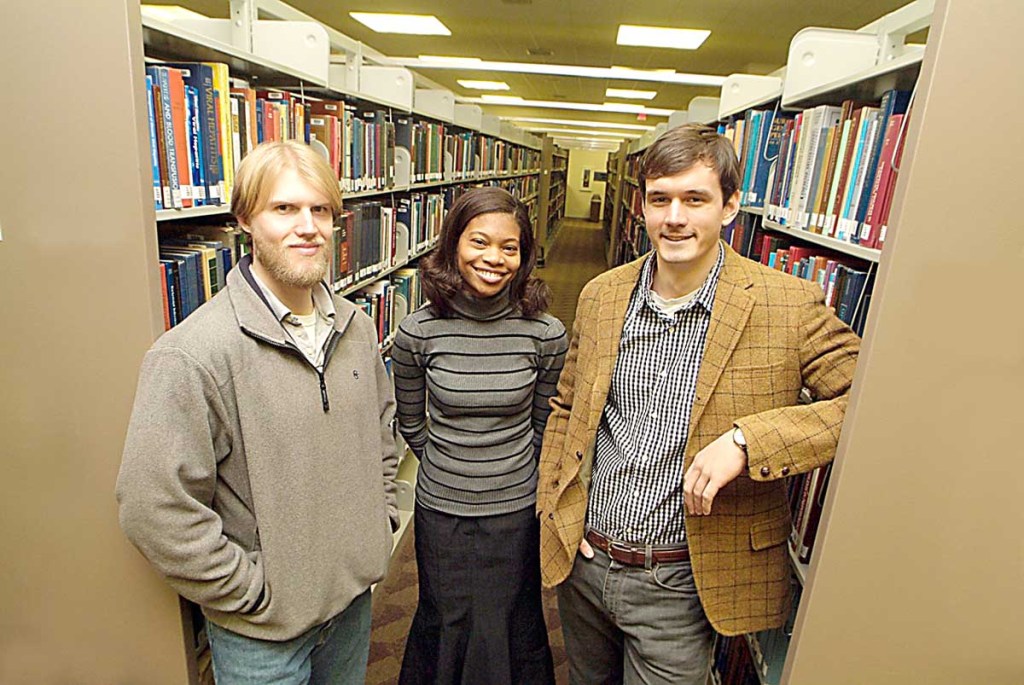MCG School of Medicine Southwest Georgia campus opens doors to resident students
Published 10:23 pm Friday, July 2, 2010

- MCG medical students, from left, Brian Gebhardt, from Albany; Shavonda Thomas, from Waynesboro; and George Miller, from Savannah, are among 17 third-year students who will be living and learning in Southwest Georgia starting July 6.
Beginning July 6, 17 Medical College of Georgia School of Medicine students will start living and learning in Southwest Georgia for the majority of their clinically intensive third and fourth years.
The five-year-old Southwest Georgia Clinical Campus of the MCG School of Medicine — based at Phoebe Putney Memorial Hospital in Albany and spanning from Valdosta to LaGrange — has progressed to residential clinical status. The campus is expanding clinical experiences for MCG students as it exposes them to the practice of medicine in more underserved areas of Georgia.
Officials from the School of Medicine and Phoebe Putney will welcome students July 6 in a 10:30 a.m. ceremony on the campus located within Phoebe’s Learning Center, at the corner of Jefferson Street and Fourth Avenue. A formal ribbon cutting of the new campus office will be held at 4:30 p.m. July 14.
“Southwest Georgia recognizes the importance of educating the next generation of physicians,” said Dr. Doug Miller, medical school dean and MCG’s senior vice president for health affairs. “This type of forward thinking on the part of physicians and hospital leaders is essential to the School of Medicine’s expansion initiative to better meet the physician needs for our rapidly growing state.”
“Without the 140-plus clinical faculty members across Southwest Georgia who volunteer their time to teach students and the hospitals throughout this region, we would not have a campus,” echoed Dr. William Guest, the campus’ assistant dean for curriculum. Critical as well is the Southwest Georgia Area Health Education Center, led by Pam Reynolds, a “behind-the-scenes partner” that helps the campus arrange everything from clinical rotations to student housing. “They are the catalyst that makes a lot of this work,” Guest said.
Last year, the Liaison Committee on Medical Education, the accrediting body for U.S. medical schools, determined the campus was on track for becoming a two-year residential clinical campus and the School of Medicine approved a physician leadership and advocacy campus curriculum, said Dr. Linda Boyd, associate dean for regional campus coordination in the MCG School of Medicine. Strong physician leaders, such as patient advocate Dr. James Hotz, an Albany internist who inspired the 1991 movie “Doc Hollywood,” can help prepare students for lifelong roles as leaders in their profession and community, she said.
“Phoebe’s Board of Directors recognized 15 years ago that we had both an undersupply of physicians and a growing number of patients,” said Joel Wernick, president and chief executive officer of Phoebe Putney Memorial Hospital. “We have deliberately built our program in partnership with other organizations, such as the MCG School of Medicine, that have other pieces of the puzzle. We’re confident that when medical students experience Southwest Georgia, they will want to return and build a practice,” said Wernick, who leads the 443-bed teaching hospital with more than 300 physicians, 3,800 professional staff and a family medicine training program.
“The tendency is to practice where you train,” echoed Dr. Doug Patten, senior vice president of medical affairs, Phoebe Putney Memorial Hospital. “The more robust the student experience here, the more likely they are to practice here. Our hope is that providing medical education here would create a pipeline of primary care physicians into this region and help offset the current and predicted physician shortage.”
In 2009, more than 200 MCG medical students completed one or more clinical rotations in Southwest Georgia, working with physicians for four- to six-week stints in specialties including family medicine, pediatrics, surgery and obstetrics-gynecology. Residential clinical campus status won’t preclude these shorter stays for students, only provide more options, Boyd said.
The Southwest Georgia campus is part of an overall plan to increase the MCG School of Medicine’s class size from 190 to 300 students by 2020 to help meet the need for physicians in a state that ranks in the top 10 both in population and population growth, according to the U.S. Census Bureau.
The statewide plan includes a second clinical campus, Southeast Georgia Clinical Campus based at St. Joseph’s/Candler Health System in Savannah, which also is slated for residential campus designation in coming years, and a four-year campus for 40 students in Athens in cooperation with the University of Georgia where students begin classes Aug. 9. The medical school class size is scheduled to increase from 190 to 240 in Augusta and 40 to 60 in Athens by 2020. Facilities to accommodate the larger class in Augusta are under design.





